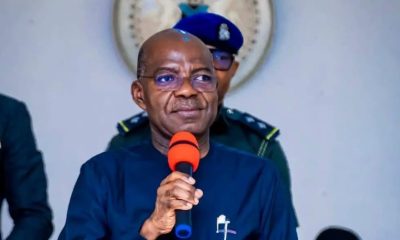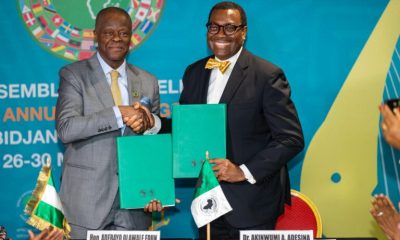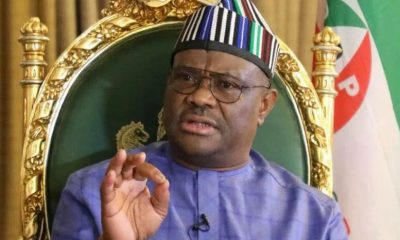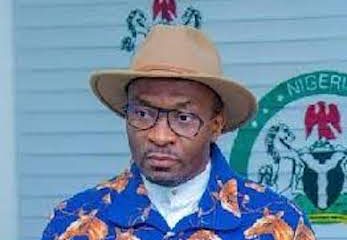EDITORIAL
President Buhari’s Ministerial Nominees

In 2015, when President Muhammadu Buhari was elected for his first term in office, the president took six months to make public the names of ministerial nominees and not a few Nigerians were taken aback by that action, which some described as lack of preparedness for the office, for a man who had contested elections to that office and only won at his fourth attempt.
And so, when he was elected for a second term in February 2019, the expectation was that whatever problem it was that caused the initial delay may have been fixed and so it will take a shorter period to put together a team.
In fact, the expectation in many quarters was that the president will reveal the names of nominees immediately after taking the oath of office on May 29, but that was not be.Last week, five clear months after his election for a second term and two months after taking his oath of office, President Buhari finally sent the ministerial nominee list to the Senate. Even this took a reminder from the leadership of the Senate that if the list did not reach the Senate before July 26, members would be proceeding on a long recess to resume in September.
The president had stated at a meeting with the National Assembly leadership that even though he was under severe pressure to reveal those he would be working with, he was being careful and more thorough this time, to avoid a repeat of the situation in his first term when people not known to him were foisted on him by his party, the All Progressives Congress (APC) and some individuals. He assured that this time, he would pick only those personally known to him, whose competence and suitability for the job he could vouch for.
It is for this reason that the list, as finally released, left not a few people wondering what the long wait was all about, as the list is populated with returning ministers from his first term, people who have been in public service and those who held political positions previously. In fact, it is perceived as an assemblage of election losers for compensation.
With the delay in coming up with a team to initiate and implement development polices, there is the tendency to imagine that there is some rocket science behind this but no. In the United Kingdom, only last week, the new Prime Minister, Boris Johnson, assembled his cabinet shortly after having declared in his speech that “Today, the campaign is over and the work begins.” Johnson was reported to have spent the 24 hours after his emergence, locked away with aides gathering a cabinet that will help him deliver the promises on which he campaigned. That is how a man prepared for the onerous task of leadership approaches his job.
It is the position of this newspaper that the myriad challenges Nigeria faces, especially with the economy was enough impetus for the president to come up with a crack team that would help in actualising the policies and programmes he has outlined in his Next Level agenda for the country.
Nigeria, more than ever before, is in need of leadership that can midwife the process of returning the country, which economy is struggling, having pulled out of a recession not too long ago with warnings of a relapse from the Central Bank, back to prosperity.
According to reports, the economy contracted by 43 per cent in 2018 to foreign direct investment, government divestment from businesses, and reform of the corruption-infested oil sector. This is in addition to IMF’s low growth rate forecast of 2.3 per cent for the year and 11.4 per cent inflation.
Wealth creation and jobs is what the country needs to change the trajectory of the economy and what needs to be done to achieve this is to first of all, have leaders who have the required competence, egghead technocrats with proven track record of performance, across party lines, to drive the process.
Beyond the less than inspiring team of ministerial nominees, the manner of screening of the nominees by the Senate leaves so much to be desired. The screening of the nominees by the Senate was a total sham and elevation of the absurd, as nearly every nominee was simply asked to “take a bow and go.”
A serious Senate would thoroughly grill the nominees, especially the returning ministers on their past performance but this wasn’t the case. It is unimaginable that past holders of public office, some of whom have cases of alleged corruption with the anti-corruption agencies were not questioned about those by the Senate in that poor show it put up.
What the Senate did was just a hollow ritual, which goes to prove public assertions that it is a rubber stamp legislature.
It remains to be seen how this team assembled by the president can move Nigeria to the much touted “Next Level,” in the hope that the ministers would be inaugurated with the same speed at which their screening was conducted, so that they can hit the ground running with the business of governance.
EDITORIAL
Need to Urgently Redeem the Image of Nigeria’s Judiciary

The symbol of a blindfolded lady with a scale in one hand and a knife in the other depicts the balance and fairness the judiciary should represent in the society.This iconic symbol is meant to convey that justice should be administered without fear or favour, and that the law is applied equally to all and sundry, no matter whose ox is goored.
The blindfold signifies impartiality – that justice is blind to external influences, biases, or prejudices. It emphasizes Objectivity – that justice should be based solely on the facts and evidence presented before the court of law.The blindfold also represents fairness – that justice is fair and equal for all, regardless of social status, wealth, or other societal factors.It is the totality of all of these that the judiciary is aptly described as ‘the hope of a common man.’ However, there are discordant definitions of justice, being dished out by judicial officers in Nigeria today.Allegations of bribery, fraud, undue adjournments and delay of cases, favouritism in appointments and promotion of judicial officers, conflicting judgements of courts of coordinate jurisdiction or judgements that are at variance with earlier precedence, et al.One worrisome judicial spectacle is the conflicting judgements, especially from political cases before the courts. All of these have severely dented the image of Nigeria’s judiciary. Consequently, keen watchers make unsavoury remarks that justice has become a precious gift to only the ‘highest bidder,’ while others castigate certain judicial pronouncements as ‘jankara judgements.’ This should not be the case. A large dose and over-reliance on ‘technicalities’ by the courts rather than objectivity and substance of the case is another sore thump of the judiciary. Arguments bordering on technicalities in a case are sometimes escalated up to the apex court, thereby unduly delaying the hearing of the substantive case before the court.The appointment and promotion of judicial officers is another clog militating against transparency of justice delivery.Sections 231(3) of the Constitution of the Federal Republic of Nigeria (as amended) states; ‘A person shall not be qualified to hold the office of Chief Justice of the Supreme Court , unless he is qualified to practice as a legal practitioner in Nigeria and has been so qualified for a period of not less than fifteen years.’In same way, Sections 238(3), 239(3), 250(3) et al, states that a qualified legal practitioner with not less than twelve years and ten years are respectively qualified to be a Chief Judge of the Court of Appeal and Federal High Court, while ten years minimum qualification is stipulated for qualified legal practitioners to occupy the seat of the State High Court and the National Industrial Court in the other Sections that follow.The intent of the Constitution is that any qualified and competent legal practitioner from either the bench or the bar can be appointed as a judge in any court, including the Supreme Court. It is also the intent of the Constitution that the promotion of judicial officers to a higher court must not be sorely based on seniority in service. To reverse this, there have been pressures for appointment of qualified senior lawyers from the bar as Supreme Court judges and Court of Appeal to invigorate the judiciary to no avail. Thus, the old culture of ‘wait for your turn’ in the promotion of judicial officers whose thinking and actions are conditioned to the old order has continued to gain currency.DAILY ASSET urges the judiciary to immediately return to the constitutional provision as enshrined in Sections 231(3), 238(3), 250(3) et al, of the 1999 Constitution of the Federal Republic of Nigeria (as amended) to appoint qualified legal practitioners through a competitive process in order to inject a new dose of adjudication for the betterment of justice delivery. This will go a long way in rekindling and orientating the negative image of the judiciary in the country.Judges who will mount the saddle through this competitive process will be adequately armed with a new orientation that will usher in speedy dispensation of justice. It will also mark a departure from the ‘wait for your turn’ syndrome of promoting judicial officers on the bench based on seniority in service.The judiciary must do a critical introspection and reform both criminal and civil justice administration by timely attendance to cases in keeping to the axiom of ‘justice delayed is justice denied.’This is the sure way for the judiciary to redeem it’s badly battered image and restore hope and confidence by the public. ReplyForwardAdd reactionEDITORIAL
A Word Against Women Underrepresentation in Nigerian Politics

Women underrepresentation and marginalization in Nigeria’s political and democratic governance may not be reversed soon judging from the male chauvinism and non-adherence to the Beijing declaration more than two decades ago.Women comprise about 49.32 % of Nigeria’s population, yet they are relegated to the background politically, economically and in governance.
Historically, politics has been a male-dominated occupation but many countries in the world have long before now started encouraging women to actively participate in politics. Improving women’s political participation and representation should be prioritized by the political elite, currently dominated by men folk in Nigeria.Section 40 of the 1999 Constitution of Nigeria (as amended), guarantees the right to free assembly and association, including forming or joining political parties. However, women remain grossly underrepresented. The Beijing Declaration at the Fourth World Conference on Women in 1995, stipulates that 35% of political positions be reserved for women; unfortunately, this provision has been jettioned in Nigeria by the male-dominated political class. Efforts by various groups to enforce this 35% affirmative action have met a brick wall.In March 2022, the National Assembly rejected a bill requiring affirmative action for women in political party administration and specific legislative seats. Again, another bill proposing special seats for women in the national and state assemblies was also defeated.Factors such as religion, cultural norms, nepotism, socioeconomic barriers, political violence, illiteracy among women, and contradictory government policies impede women’s political representation. These issues hinder the full realization of 35% affirmative action in the country’s political space. Proponents of women participation in politics have continued to urge the government to demonstrate more commitment to women representation and participation in politics by endorsing, adapting and domesticating international and regional human rights instruments. Promoting affirmative action to build a critical mass of women in leadership roles and reviewing practices that marginalize women should henceforth be a priority in the nation’s political engineering.Those who belong to the school of thought that lowering the bar for women to participate in politics is counterproductive must have a rethink and pause to critically look at countries which have reserved at least 35% political representation and participation for women. Such countries are making tremendous progress in socio-political development.For instance, Rwanda sits atop Africa’s continent, nay the world, with a female majority in the National Assembly with 63.75% in House of Representatives and 53.75% in the Senate. Also, a number of countries whose presidents and or vice presidents are women no doubt, are making steady progress in all indices of development.The highest number of women ever elected into the National Assembly is thirty-six in 2007 with twenty-seven in the House of Representatives and nine in the Senate. Since then, there has been a steady decline to thirty-two in 2011, twenty-two in 2015 and eleven in 2019. It further declined to a paltry four women out of the 109 seats in the Senate in 2023, representing a meagre 2.7%, in spite of strategies to improve women’s political representation in Nigeria.The history of any nation cannot be complete without equitable contribution of women, which mostly go uncelebrated. Women play significant roles in our homes, offices and businesses and provide support systems leading to stability, productivity and profitability.However, governments at all levels through their policies, programmes, budgeting and service delivery processes over the years have failed to address the structural and social disadvantages that inhibit gender mainstreaming. This has placed women greatly at a disadvantage, leading to their exclusion.The private sector is not also left out from the marginalization of women. They have mostly remained reluctant to respond to deep disadvantages that cripple women eligibility to access funding, mainly in the areas of collateral and interest rates. Special consideration must be given to women, because with greater gender equality or rather equity in both public and private sectors, the benefits would be far-reaching especially in reducing poverty among other socio-economic gains. Globally, governments and gender advocates have over the years come up with resolutions to accelerate gender inclusion.Platforms like the Conference on Women, 1975, which was the first international conference held by the United Nations to focus solely on women’s issues, marked a turning point in policy directives. Another major significant step as earlier mentioned was the Beijing Conference in China that provided the framework to extend the frontiers for gender mainstreaming. Since then significant but sometimes inconsistent progress has been made in advancing gender inclusion. Many countries have continued to enact laws and formulate policies, but implementation remains the challenge.For instance, as with other critical sectors of the Nigerian economy, the enormous economic role played by women in the agricultural sector has remained barely supported and undervalued. In contrast to their male counterparts in agriculture, female participants in the sector have relatively narrow access to funding, inputs, training, extension services, land, technology, markets and decision making opportunities.Available reports have shown that female participants in the agriculture sector represent only 8% of landowners, access only 10% of available credit and 5% of extension services. This has restricted a large number of women at the level of subsistence farming, with the men dominating the commercial and lucrative aspect – largely exacerbating gender inequalities.Similarly, in politics women representation in terms of elective and appointive positions still leaves much to be desired.DAILY ASSET is of the opinion that the number of female ministers, commissioners and legislators at federal and state levels should be increased by a law duly passed by parliaments at national and sub-national levels and duly accented to by appropriate authorities. Through the acts of parliament, plans, policies, budget and service delivery become more gender sensitive to promote inclusion.Nigeria cannot make progress when half of the population is excluded from decision-making. Policy makers must keep to the axiom, ‘when you empower a woman you empower a nation.’EDITORIAL
Deploy Technology and Intelligence to Fight Insecurity

The growing insecurity in Nigeria – banditry, kidnappings, terrorism and other violent crimes, can rightly be described ‘a national calamity’ that requires the use of technology and intelligence to combat.Realising this, Plateau, a North Central state, grappling with worse security challenges, has announced its partnership with Biench UAS Limited to acquire military-grade drones for surveillance, intelligence gathering and rapid response by security agencies.
At the recent unveiling of Briech UAS-manufactured drones and missiles in Kuje, the Federal Capital Territory (FCT), Abuja, Governor Caleb Mutfwang, alongside the Chief of Defence Staff, General Christopher Musa, emphasized the critical role of technology in modern security operations. They noted that the partnership represents a fresh and innovative approach to tackling security threats in the State and the nation at large.Mutfwang, commended the Nigerian Armed Forces for their dedication to national security. He called on the Nigerian military to encourage local manufacturers in producing military-grade surveillance equipment tailored towards tackling the nation’s unique security challenges.He further highlighted the impact of the partnership, noting that the deployment of Briech UAS facilities in Plateau State has already enhanced the efficiency of security forces on the ground and expressed optimism that the collaboration would further strengthen security operations, ultimately restoring peace and enabling farmers to return safely to their fields.“The time is now to address these challenges that hinder national prosperity. One of my key aspirations for this year is to see Plateau State farmers return to their farms. The only way to achieve this is by providing them with adequate security coverage, both in the air and on the ground, ensuring their safety”, the governor stated.Nigeria’s Chief of Defence Staff, General Christopher Musa, lauded the innovation and initiative and assured that the Defence Headquarters would explore collaborative opportunities with the company to enhance national security efforts.“It is with great honour and appreciation that I witnessed the unveiling and live demonstration of the first set of locally manufactured attack drones by Briech UAS Limited. This marks a significant milestone in our nation’s journey toward self-reliance in defense technology and a major step in strengthening our security capabilities.”If properly utilized, the acquisition of cutting-edge surveillance technology and intelligence would significantly boost the capacity of security personnel to decisively combat criminal elements that are operating with different cells across the country.In fact, those technological advancements could contribute to securing victory over forces that have long destabilized the nation.Additionally, the cutting-edge technologies would provide critical intelligence to enable security forces to take swift and decisive actions against emerging threats.Moreover, in an era of increasingly complex security challenges, the adoption of advanced surveillance technology is pivotal to achieving optimal operational outcomes.The significance of the latest advancements in unmanned aerial vehicle (UAV) technology is a landmark achievement in the nation’s pursuit of enhanced security solutions hence the UAVs are equipped with advanced sensors and imaging technologies to enable them to detect and monitor activities that pose threats to national security.It is embarrassing, shameful and a monumental failure on the part of security agencies who for over two decades have been fighting insurgents, bandits, terrorists, arsonists and kidnappers without much success.In some instances, victims who fall prey to the criminals are brutally murdered while others are held in captivity under inhuman conditions for more than six months. Yet the criminals engage in telephone communication with security agencies and families of the victims without a clear cut way to track and attack them and rescue the innocent victims. This is an indictment on our security agencies.Recall when an American was kidnapped in a boarder town in Niger, a few years ago and trafficked across to Nigeria, the American seals, through the use of technology, tracked and promptly rescued one of their own in less than 24 hours.The Federal Government had acquired and equipped the Nigeria Air force with over 70 combat aircrafts in the last decade. Similarly, the combat equipment of the Nigeria Army, Nigeria Navy, Nigeria Police and other paramilitary forces have been enhanced, yet non-state actors are daily devising new criminal methods of perpetuating insecurity rather than the security agencies caging them.DAILY ASSET urges the Nigerian security agencies to immediately start deploying emerging technologies as well as strengthen intelligence gathering to make the country safe just as the security agencies of advanced nations deploy technology to check criminal activities of non-state actors.We commend the local assembly and manufacturing of military-grade surveillance drones and missiles as a step in the right direction that should be tailored to the nation’s unique security challenges.




















